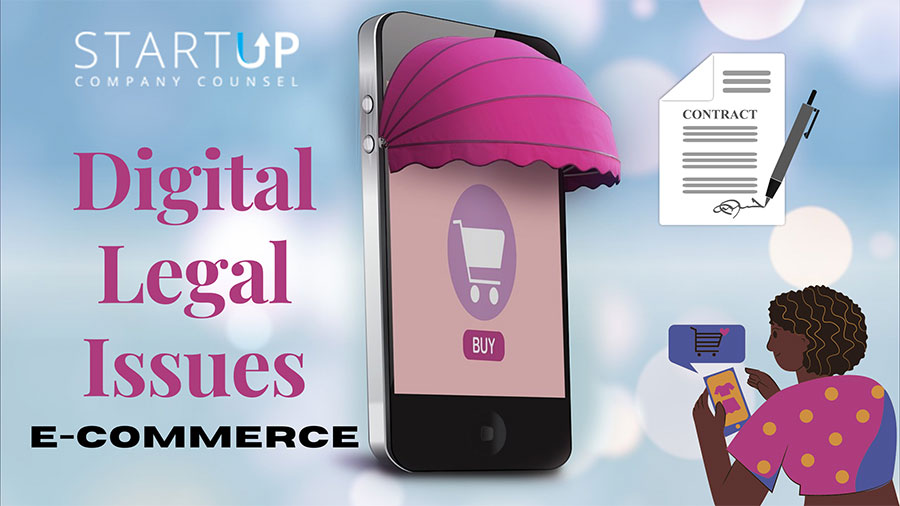Legal Challenges of New Online E-commerce Startup Firms
With the growing online business, entrepreneurs involved-in or seeking to be involved in the e-commerce industry must understand the legalities that surround it. eCommerce legal and law includes all the legalities related to the e-commerce business. Ecommerce firms must continue by specific laws and regulations just like any other business. They can also face legal issues for which they can get help from an experienced e-commerce lawyer. The laws that apply are diverse and can be tricky.
As a first step in protecting your eCommerce venture, ensure your terms of use section is as specific as feasible. If you sell products from third-party vendors, uncover that as well. Also, clearly define how clients can cancel or return purchases they’ve got from your website. It’s also crucial that you have a mechanism informing customers of their shopping within 24 hours of the purchase.
Some of the legal challenges that can create or crush an e-commerce business are mentioned-below. Be prepared when it comes to starting your e-commerce business.
Some Legal Challenges for E-Commerce Businesses Includes
Protecting Intellectual Property
Protecting company copyrights and trademarks is a legal concern for an e-commerce business. When a small business works on e-commerce ways, its name, logo, and content can be taken by other web-users if they don’t have the appropriate copyrights and trademarks. In reality, losing a logo or company-name can spell disaster for a business, especially a smaller business or a recent startup. One should consult with “StartUp Company Counsel’s solicitor’s experience in intellectual property law.
Setting -Terms & Conditions
We must define “terms & conditions” agreements for our e-commerce business as they are vitally important for a business owner to resolve legal matters. These work best for online transactions as they include limits of liability, specify return policies, tax regulations, delivery terms, and other consumer-focused regulations. It protects the company and builds a system in the case of a legal dispute.
Privacy and Security
The Law on Personal Data Protection asks the trader to be registered as a data administrator into the Personal Data Protection Commission register. The law explains in detail the obligations of the administrators of personal data. E-commerce websites must have a policy for personal data protection open and post in a noticeable place on the site.
Common Legal Issues Faced By E-Commerce Businesses
What could be the legal issues can e-commerce business experience during marketing?
FTC regulations expect advertising to be honest and not misleading. If the business is non-compliant with the FTC regulations for proper digital disclosures, they can investigate the business & put hefty fines or sue the company in court.
Some other social issues in e-commerce business included are –
Ecommerce Shipping and Delivery Policy
Frame a clear delivery policy to enable customers to know when to expect their products. Give specific & expected delivery timeframes and costs, as well as detailed terms on any shipping promotions.
Ecommerce Refunds Policy
Required Refunds build trust with customers. Include your refund policy on your website and certainly within your terms and conditions so that buyers thoroughly know the details.
Also, with a refund policy, you can know why your customers are refunding. With that, you can work on getting the percentage down.
Protecting Customer’s Privacy
It is essential to maintain Online privacy as many eCommerce sites collect and retain their clients’ personal information. The customer’s name, address, email address, and credit/debit card details are all given. Hence, it is the company’s responsibility to ensure this personally identifiable information is protected and comply with federal and state privacy laws.
Online Deals
Forming legally binding online agreements that have- an offer and acceptance, consideration, and a capacity to enter into a contract is required. There are two ways to know a transaction has taken place between the consumer and the business-
- Having a document or record in writing,
- or recording or retaining all the necessary information in electronic form
Online Advertising Compliance
The FTC has guidelines for advertising to guard consumers and to prevent deceptive and unfair acts or practices. Ecommerce site companies should be aware of the relevant laws for online advertising.
Payment Gateways
Several payment gateways are available for e-Commerce businesses. On vetting payment gateways, check if they have any limitations around specific products, and if they are:
- Hosted or non-hosted,
- Require transaction fees, termination fees, monthly fees, or setup fees,
- Include anti-fraud features
The Bottom Line
As companies are transitioning into e-commerce, they can expand the business to a global scale. Though there are accompanying issues for eCommerce entrepreneurs that they must be aware of. eCommerce regulations generally differ by country. For eCommerce Legal issues, we recommend having an experienced attorney that can help increase productivity while saving from legal challenges that online startups or e-commerce businesses engage with.




